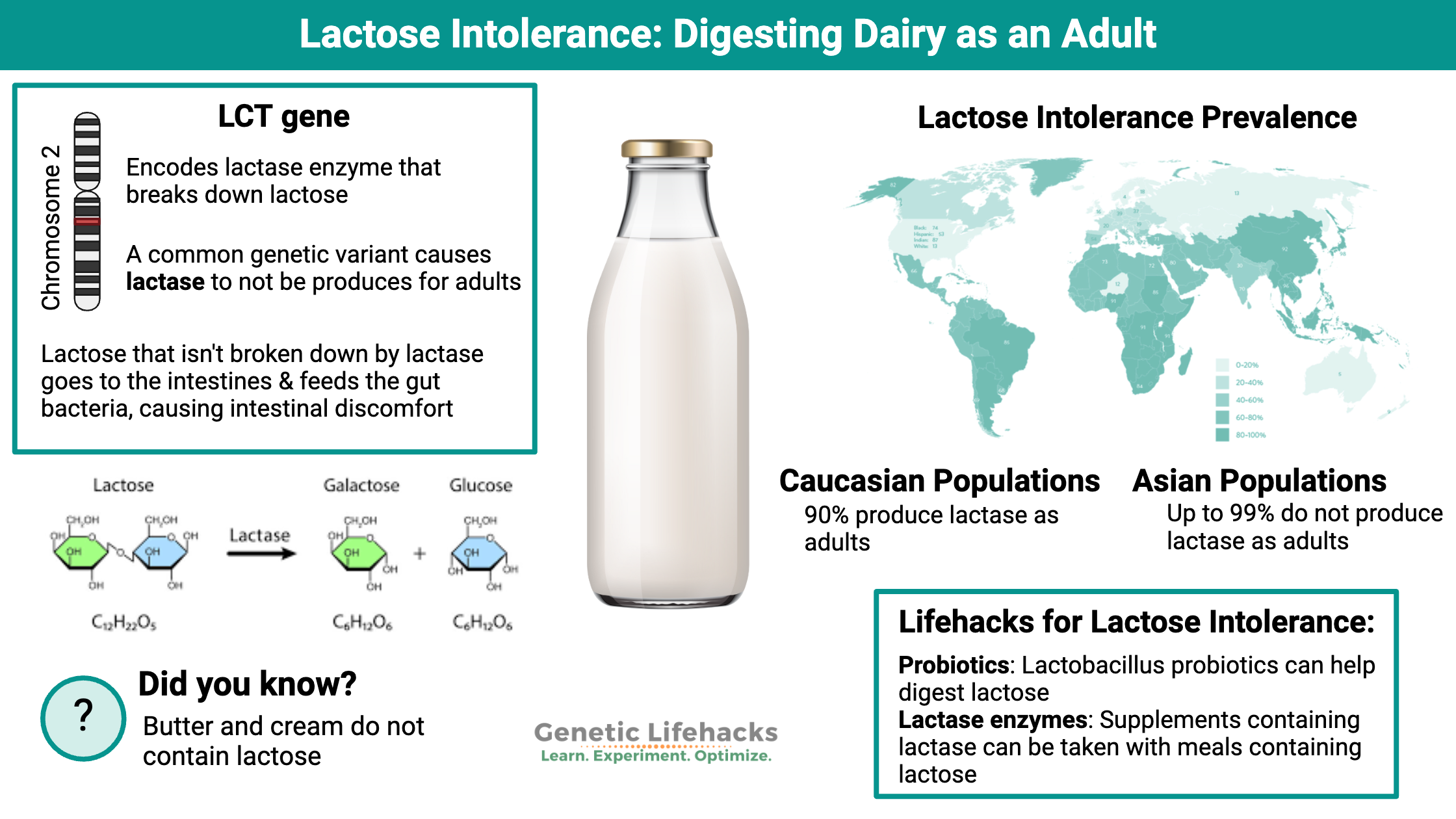Key takeaways:
~ Lactase is the enzyme that breaks down lactose, a sugar found in dairy products.
~ Your genes control whether you will produce lactase as an adult. While most people with European background produce lactase as an adult, most people with Asian ancestry do not.
~ It’s easy to check your 23 and Me or AncestryDNA raw data to see if you are likely lactose intolerant.
~ Even if you don’t produce lactase, your gut bacteria make it possible to break down some dairy.
Members will see their genotype report below, plus additional solutions in the Lifehacks section. Consider joining today.
Lactose and Lactase:
Lactose, a sugar in milk, is broken down by lactase, which is an enzyme produced in the small intestines.
While it is essential for babies and children to be able to break down lactose in breast milk, for many people, the production of the lactase enzyme stops before adulthood.
Whether or not you still produce lactase as an adult is based on your genes. A genetic variation near the LCT gene drives the persistence of lactase.
Thus, many adults are genetically predisposed not to be able to digest larger quantities of milk, also known as lactose intolerance. Others may be able to consume all the dairy that they wish to with no digestive problems.
Certain microbes in your intestines can also break down lactose, so adults who don’t produce lactase can usually handle some dairy products — like milk in their coffee each morning. Regular, small amounts of lactose are broken down by Lactobacillus bacteria in the gut.
What exactly is lactose?
Lactose is a compound sugar, meaning it is two different sugar molecules stuck together. Glucose and galactose are the two sugar molecules combined together in lactose. The lactase enzyme splits apart the sugar molecules, and your cells then use the glucose and the galactose for energy.
Without lactase to split up lactose, it ends up traveling through your intestines and feeding your gut microbes. An overabundance of lactose can disrupt your microbial balance – giving you bloating, cramping, and even diarrhea.
Lactose intolerance: Asian vs. European Ancestry
The percentage of the population with genetic variations differs quite a bit among people with different ancestry.
- Producing lactase as an adult is the most common genotype for European Caucasian populations (90%+ can digest lactose).
- In Asian populations, the vast majority (~99%) do not produce lactase as an adult.
Historical and ancestry perspective:
A theory for differences in population percentages seems to be an adaptation by Caucasian populations in Europe who relied on dairy products as a source of protein. People born with the LCT variant could thrive – or more easily survive in tough times – on the higher protein contained in dairy products. This made it a survival advantage to digest dairy, but only in areas where sheep and cattle were used for milk.
For people with European Caucasian ancestry, the main variant (SNP) to look at is rs4988235. It is located in the MCM6 gene, which influences the LCT gene. Approximately 90% of Caucasians will have A/A or A/G and still produce lactase to break down milk as an adult. In people with Asian ancestry, less than one percent will carry the G allele.
The adaptation of the LCT gene to continue producing lactase into adulthood is one that came about through different variants in different population groups. In other words, a different mutation that allowed lactase persistence arose and became prevalent in people with African ancestry and then in Middle Eastern ancestry.
People with African ancestry may find that they carry a different variant in the MCM6 gene that also causes lactase persistence as an adult. (In the Genotype Report section below)
Bacteria in the gut can also break down lactose, so even people who don’t produce lactase as an adult can often handle digesting limited amounts of milk. This is going to be contingent on your gut microbiome and how often you consume milk products.
Lactose Intolerance Genotype Report
Members: Log in to see your data below.
Not a member? Join here.
Why is this section is now only for members? Here’s why…
Related Articles and Topics:
Shining Genetic Light on Your Vitamin D Levels
Your vitamin D levels are impacted by sun exposure and your genes. Learn more about how vitamin D is made in the body and how your genetic variants impact your levels.
Do you carry the Hunter-Gatherer or the Farmer Genetic Variant?
Our ancient ancestors lived much differently than we do today. They were hunter-gatherers, living off of fish, meat, and plant foods that they gathered. A considerable shift occurred when those hunter-gatherers began farming, growing grains, and storing them so that food would be available all year.
Does cilantro taste like soap to you?
Learn how an odor receptor gene influences your taste for cilantro.
Debbie Moon is the founder of Genetic Lifehacks. Fascinated by the connections between genes, diet, and health, her goal is to help you understand how to apply genetics to your diet and lifestyle decisions. Debbie has a BS in engineering from Colorado School of Mines and an MSc in biological sciences from Clemson University. Debbie combines an engineering mindset with a biological systems approach to help you understand how genetic differences impact your optimal health.

